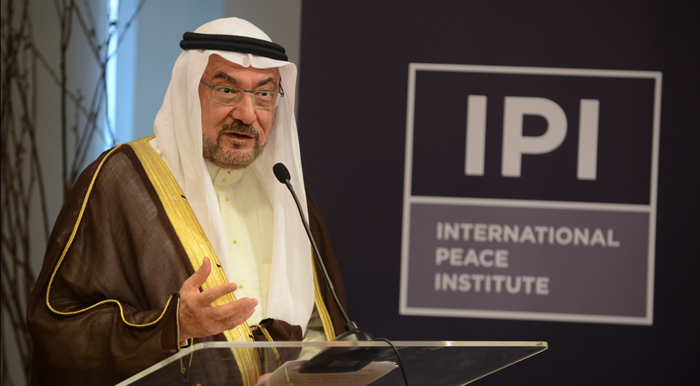
Iyad Madani, the Secretary-General of the Organisation of Islamic Cooperation (OIC), reaffirmed at IPI the Muslim world’s commitment to religious tolerance and human rights and sought to distance Islam from the recent violent actions at the hands of extremist groups across Africa and the Middle East.
Speaking to an overflow IPI audience on September 19th on “The Role of the OIC Today: Challenges and Opportunities,” Mr. Madani, who took office in January 2014, discussed topics ranging from sectarian strife to the Arab-Israeli conflict, the Islamic State, and inter-faith dialogue, and challenged what he called misinformation concerning Islam and Muslims around the world.
He said that although groups such as Boko Haram and the “Islamic” State claim to act according to Islamic precepts, Islam shares no commonality with them.
“As these groups carry out their heinous terrorist activity, they are claiming justifications in the name of Islam,” he said. “[But] there is nothing that can be further from the truth. This craziness cannot be associated with any religion and it has to be examined carefully.”
The Islamic State, Mr. Madani said, has killed more Muslims than any other denomination, and its persecution of Christians and other minorities only helps emphasize the criminal nature of the group. Unfortunately, Mr. Madani said, the group’s actions have only contributed to more religious and ethnic polarization.
“We live in a world that is increasingly polarized along the lines of ethnicity, race, and religion,” Mr. Madani said. “[And w]hen it comes to Islam, one could unmistakably note that…Muslims are stigmatized, singled out, and associated with a culture of backwardness, violence, and terrorism.”
The actions of such groups are tainting the reputation of Islam, he said, despite the fact that religion is simply being used as a political and legitimizing tool. But knowing that, he added, is already an advantage.
“They are now claiming legitimacy from an Islamic point of view,” he said. That means that “[we] should hit them at [that] legitimacy.”
In addressing the violent actions of the Islamic State, Mr. Madani also assessed the current political situation in Iraq. The country, he said, is grappling with the aftermath of more than a decade of war and the legacy of a US invasion that completely dismantled the Iraqi state. In a way, he said, what we are seeing today in the country is a direct result of the decisions taken then by the US administration.
“The post-invasion phase saw one of the most amazing episodes in which the decision was made to dismantle the [entire Iraqi] bureaucracy,” he said. “Iraq was simply left in a big huge void.”
That created a tense atmosphere in the country, he said, with people losing the feeling of national identity and resorting to ethnic and sectarian partisanship. “That sectarian identity was encouraged, and eventually it ended in the violent Iraq that [has] never had a stable moment in the past years,” he said.
As for the Arab-Israeli conflict, he said the conflict over Palestine can be resolved, but that Israel and its supporters ought to make a real and firm commitment to peace.
While assessing the most recent war—the 50-day conflict that broke out in July 2014 between Hamas and Israel, killing over 2,000 people on both sides—Mr. Madani said that, overall, the actions of Israel have largely been unjustifiable.
“We consider the Israeli action in Gaza as brutal,” he said. Usually, when a conflict takes place, people can flee—that is why you have refugee camps, he said. But in the case of the Gaza war, he argued, Palestinian refugees had no place to go. “Gaza is just a big prison,” he said.
The current situation, he said, is an unnecessary one and one that can and should be solved soon.
“We have the means to end the conflict [and] we must muster the political will [to do so],” he added. In that regard, he chided the United States for failing to provide that political will and criticized the US decision to oppose a UN Human Rights Council resolution launching an investigation of the Gaza conflict.
On the Islamic State, he praised the international coalition rallied by the Obama administration, but noted that a military response won’t suffice. What is needed, he said, is a strong political effort that can rebuild Iraq’s political institutions, bureaucracy, and national identity. “That is the real environment that will dig deep in the roots of Da’ash,” he said, referring to the Islamic State.
With regard to extremism more generally, Mr. Madani said that key contributing factors such as poverty and social exclusion ought to be at the forefront of the international response. That is what creates an environment for recruitment, he said, as young people look for a sense of hope and belonging which they end up finding only within violent, extremist organizations.
Mr. Madani also discussed women’s rights, gender equality, and Islamophobia, all issues at the center of the OIC’s work today.
The discussion was moderated by IPI President Terje Rød-Larsen.
Watch event:







